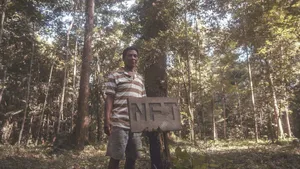Operators of Dropil crypto scam sentenced to federal prison
- "Two Orange County Men Sentenced to Federal Prison for Conning Investors Out of $1.9 Million Through Cryptocurrency Offering", U.S. Attorney's Office, Central District of California
SEC charges perpetrators of $300 million Forsage crypto pyramid scheme
Users deposited their money into projects running on the Ethereum, Tron, and Binance blockchains, and earned rewards for recruiting others to the scheme. The project also used payments from newer investors to pay out earlier investors — a Ponzi scheme.
- "SEC Charges Eleven Individuals in $300 Million Crypto Pyramid Scheme", U.S. Securities and Exchange Commission
- "SEC charges 11 people in alleged $300 million crypto Ponzi scheme", CNBC
Regulators order Voyager to stop saying they're FDIC insured
The Federal Reserve and the FDIC sent a cease-and-desist to Voyager, asking them to remove the misleading statements about deposit insurance. It would have been nice if this had come a bit earlier — perhaps before people had deposited money into accounts with the company and could no longer get it out.
OFAC has been investigating Kraken over suspected sanctions violations
- "Kraken, a U.S. Crypto Exchange, Is Suspected of Violating Sanctions", The New York Times
CEO of Titanium Blockchain Infrastructure Services pleads guilty to securities fraud
Brazilian authorities challenge NFT company Nemus after it claims ownership to land in the Amazon, allegedly pressures Indigenous people to sign documents they could not read
On July 20, they issued a press release claiming that "the World's First Non-Fungible Territory has been officially renamed by indigenous people in Brazil in coalition with Nemus". The company claims to own 41,000 hectares (~100,000 acres) of land in the Amazon.
On July 25, Brazil's Federal Prosecution Office (MPF) issued a statement that they had demanded Nemus provide proof of ownership of the areas they claim, clarification on the projects they've been promising online they would undertake, and proof that they've received authorization by the National Indian Foundation (FUNAI) or any other public body that would allow them to operate in the area and engage with various Indigenous groups.
According to the MPF, members of Indigenous groups in the area reported the company had violated their rights. They also explained that Nemus had expressed to them their plans to use heavy machinery to open an airstrip and build a road in order to access Brazil nut groves in the area. Apurinã leaders alleged that company representatives had pressured Indigenous people who do not read well to sign documents, and did not provide them with copies.
- "MPF aciona empresa que vende ativos digitais (NFTs) de áreas da Amazônia", Ministério Público Federal (in Portuguese)
- Press release by Nemus
Founder of My Big Coin convicted of $6 million crypto fraud
- "My Big Coin Founder Convicted of Cryptocurrency Fraud Scheme", U.S. Attorney's Office of the District of Massachusetts
Former Coinbase product manager charged with tipping off co-conspirators about tokens that were about to be listed on the exchange
Wahi allegedly used his access to highly confidential information around which cryptocurrency tokens would be listed and when the news would be announced to tip off his brother and friend, who would then use multiple anonymous Ethereum wallets to purchase large quantities of the token before the prices spiked on the news. According to the press release, the two took positions in at least six tokens before Coinbase announced in April 2022 that they would be listing them on the exchange. The DoJ said that the scheme had generated approximately $1.5 million in gains. The DoJ acknowledged a "Twitter account that is well known in the crypto community", likely referring to Cobie, who identified the suspicious activity.
The DoJ also reported that when Coinbase's director of security operations contacted Wahi in May asking him to attend a meeting regarding the suspicious activity, Wahi purchased a one-way flight to India in an attempt to flee the country. He was stopped by law enforcement.
The U.S. Attorney for the Southern District of New York stated in the press release, "Today's charges are a further reminder that Web3 is not a law-free zone... fraud is fraud is fraud, whether it occurs on the blockchain or on Wall Street."
Each of the charges (four against Wahi, two each against his brother and friend) carried a maximum sentence of 20 years. In May 2023, Ishan Wahi was sentenced to two years in prison; Nikhil was sentenced to ten months in prison.
- "Three Charged In First Ever Cryptocurrency Insider Trading Tipping Scheme", U.S. Department of Justice
- Indictment
Korean authorities raid seven cryptocurrency exchanges in relation to Terra investigation
FBI warns of fraudulent crypto apps that have stolen an estimated $42.7 million
The FBI stated they had identified 244 victims, and estimated the total loss associated with these fraudulent apps to be around $42.7 million.
- "Cyber Criminals Create Fraudulent Cryptocurrency Investment Applications to Defraud US Investors", Federal Bureau of Investigation





